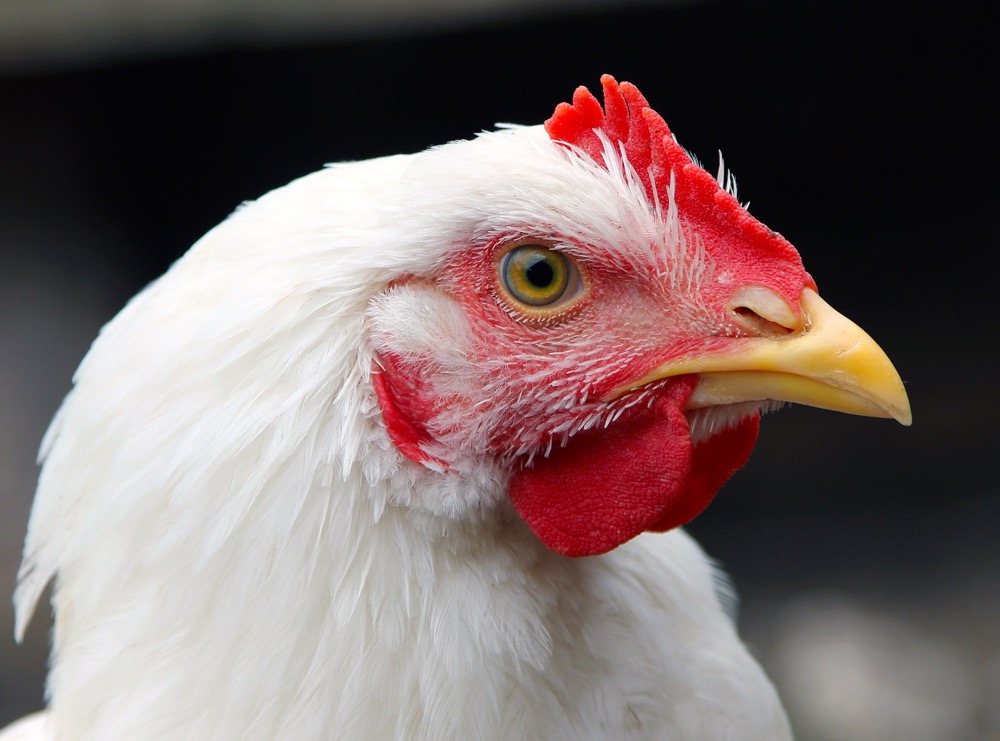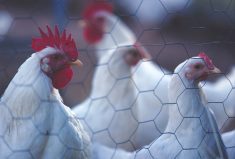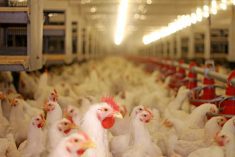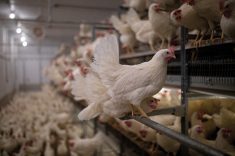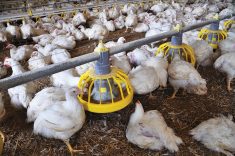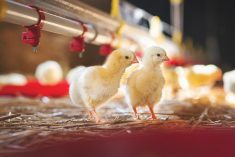Jeanette Sivilay felt her hopes of adding chickens to the co-operative farm she and her partners operate fading as she read through newly introduced rules governing small poultry production in Manitoba.
The Metanoia FarmerWorkers Co-operative, a community-shared agriculture initiative by students and alumni of Canadian Mennonite University, wouldn’t qualify for a proposed small-scale poultry production quota announced by Manitoba Chicken Farmers because they rent their land.
“I’m a young farmer and this does sound like a raw deal for me and my peers,” she said during an information session hosted by Direct Farm Manitoba Nov. 1. Sivilay later noted that many young farmers — particularly those who intend to market their products directly to the consumer — are also small farmers looking to get their start on rented land.
Others shared her concern, asking if the ban on rented land also extended to young farmers renting property from their parents or relatives. Some participants also wanted to know if exemptions could be made for producers who had long-term rental agreements in place.
“Our requirements today are that people need to own the land and the facilities,” said Wayne Hiltz, executive director of the Manitoba Chicken Producers, which crafted the new speciality quota program. “That is how it is for all of our producers.”

Reasonable
However, he said he believes the organization’s board of directors would consider any “reasonable” application, which might include allowing rented land if it was from family on a long-term basis.
In addition to landownership, the production window of 10,000 to 30,000 kg per year was also a concern raised by those in attendance.
“It seems to eliminate everybody who is young,” said Bruce Berry, an executive member of Direct Farm Manitoba and owner of Almost Urban Vegetables.
No one from the MCP board of directors attended the meeting. Reached later by phone, board chairman Jake Wiebe said some of the new program’s details are not yet finalized and remain open for discussion.
Read Also

Farm trade policy pundits lay CUSMA odds
What’s the future of Canada’s free trade agreement with the U.S. and Mexico? Policy experts try to read the stars on the issue
“The consultation process we went through at the beginning didn’t identify these issues we are beginning to hear, but we are beginning to hear some of them now,” Wiebe said. “And we are not adverse to looking at them and seeing if we can make it work.
“We are actually seriously trying to make this program work for the small-scale direct marketers, so if there are things where there is a reasonable solution and it comes to that, we’re not unreasonable — we will see if we can make something work.”
Lack of consultation
Brad Anderson, vice-president of Direct Farm Manitoba, said the fact that these issues weren’t identified earlier causes people to question the board’s sincerity.
“That to me just shows the lack of consultation that goes into this whole procedure and it’s disappointing to me,” he said during the information session at the St. Norbert Community Centre. He added that recent small-farm reports in the province have pushed for the creation of programs and policies that support young farmers, not increased barriers.
“I think this program misses that mark and I think if consultation had taken place, that would have been a focus,” he said.
Rather than attracting new entrants, the program’s design could actually push existing producers out of poultry production.
As of December 31, all existing exemptions under the special market development and servicing policy, as well as the annual farm site marketing permit system, will be cancelled. Under the new program, birds will have to be slaughtered at an inspected plant.
“We’ve held a speciality permit of 7,500 birds, but it’s put into turmoil…, so I’ve got to go back to the drawing board,” said Mike Hofer of Skyview Colony. “They are rescinding all our permits, where there is no problems, no health issues, nothing. Why?” Hofer said. “Our customers love our chickens, they want them that way, and now they are shutting it down.”
Shortage of processors
Producers in attendance noted only one of the province’s three inspected facilities accepts underquota birds.
Wiebe said that the board was working to increase that capacity, but that it couldn’t force private businesses to change their practices.
Producers who have already built their own slaughter facilities won’t be granted any exemptions under the new program. Wiebe said that grandfathering in existing processes wouldn’t meet the goal of increased food safety.
“If the question is, is there enough inspected processing capacity available, we’re not sure,” he said. “But I think we are willing to work towards that goal. In other words how quick can we get there and how can we help in the process… but I think we wouldn’t have a leg to stand on if we exempted people.”
Wiebe said the new speciality quota system is due in part to a concern that birds processed in non-inspected facilities could pose a public health risk.
“The whole intent here is inspection and assurances for the consumer,” he said. “The idea was to provide the consumer with a bird or a product that had been inspected.”
He also indicated that the provincial government had been pushing for all birds sold in the province to be inspected.
Inspected
A spokesperson for the province indicated discussions on the issue had taken place, after strategic planning done by the Manitoba Chicken Producers in 2014 identified the current system of exemption orders and permits as cumbersome to administer.
“The department had discussions internally and with stakeholders about how to address the issue of uninspected poultry around this time, because related acts and regulations were being reviewed. However, there were no formal consultations on the issue and no changes were ultimately made,” the spokesperson stated. “Uninspected farm gate sales continue to be permitted under The Public Health Act, the Food and Food Handling Regulations and the Poultry Products Regulation under The Livestock and Livestock Products Act.”
The spokesperson also said the Manitoba Farm Products Marketing Council, an appointed supervisory board that approves regulatory changes for supply-managed boards, had reviewed and approved the Chicken Producers’ plan.
“The council’s Small-Scale Producers and Processors Committee also met with MCP to review exemptions for small producers and the proposed speciality quota system,” the spokesperson noted, adding that “the council did not direct MCP to implement changes to its quota system in either of these or any other forums.”
For some meeting attendees however, the issue was bigger than the quota issue. They question the need for a regulated system altogether.
“This is what our regulated authority is,” said Hiltz. “You can not like it, that is your prerogative and I get that. But it is a supply management industry, there are regulations there and the regulations are for 999 or more (chickens) you need quota from our board.”
Balance
Wiebe said the board is willing to look for a balance that meets the needs of smaller producers while perserving the integrity of the supply-managed system. He noted that conventional producers are giving up two per cent of their own quota to facilitate the speciality quota program, which will provide small producers quota free of charge, although registration and renewal fees do apply.
“We have provincial processors who have been in business for many years. They are heavily invested and continue to invest… we have registered producers who have done the same and yet we have a market that is smaller and we have small producers who would love to be involved on a smaller scale. So we have tried to develop a program that would address that and balance those interests, we have certainly tried to do that,” he said.
“But we recognize that nobody is getting everything they are looking for, but hopefully everybody is getting something.”
Small-scale producers attending the session say the board’s proposal falls far short of balance.
“This today, it shows how far away we are from making a deal with Manitoba Chicken Producers, we are very far apart,” said Hofer.
Sivilay agreed.
“It seems like there is a pretty large distance between this program and what sounds like it could be workable for the people in this room,” she said.
But whether or not they liked the answers they received, small producers did leave with a better understanding of how the speciality quota program will work.
“We believe the program was explained in a way that let them make their own decision about whether it would fit their farm or not,” said Phil Veldhuis, president of Direct Farm Manitoba.
“We will of course want to hear from producers who do apply and we hope that their application will be taken on their merit and that some of them will qualify… If they do qualify and the program rolls out well, we’d be very pleased by that.”

